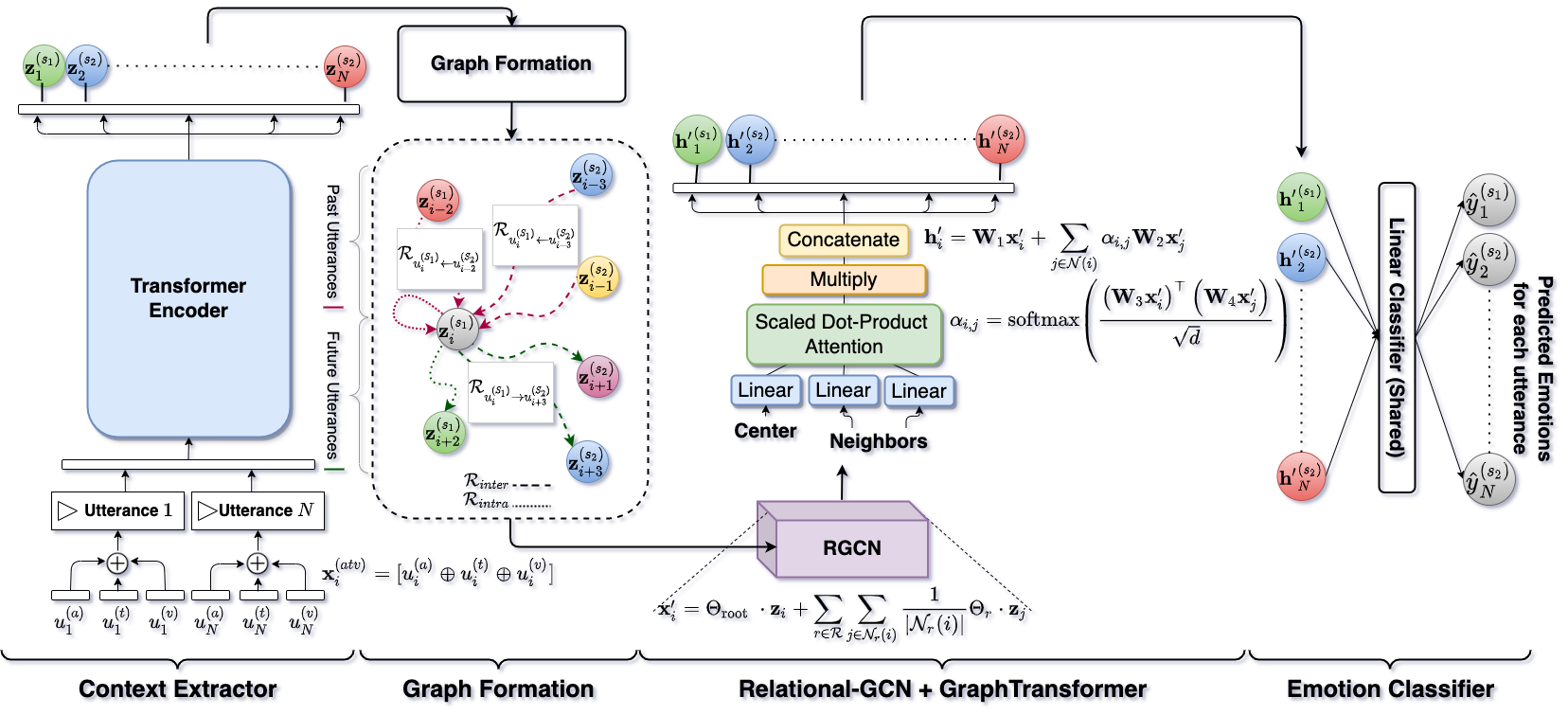COGMEN; Official Pytorch Implementation
COntextualized GNN based Multimodal Emotion recognitioN
 Picture: COGMEN Model Architecture
Picture: COGMEN Model Architecture
This repository contains the official Pytorch implementation of the following paper:
COGMEN: COntextualized GNN based Multimodal Emotion recognitioN
Authors: Abhinav Joshi, Ashwani Bhat, Ayush Jain, Atin Vikram Singh, Ashutosh Modi
Abstract: Emotions are an inherent part of human interactions, and consequently, it is imperative to develop AI systems that understand and recognize human emotions. During a conversation involving various people, a person’s emotions are influenced by the other speaker’s utterances and their own emotional state over the utterances. In this paper, we propose COntextualized Graph Neural Network based Multimodal Emotion recognitioN (COGMEN) system that leverages local information (i.e., inter/intra dependency between speakers) and global information (context). The proposed model uses Graph Neural Network (GNN) based architecture to model the complex dependencies (local and global information) in a conversation. Our model gives state-of-theart (SOTA) results on IEMOCAP and MOSEI datasets, and detailed ablation experiments show the importance of modeling information at both levels
Requirements
We use PyG (PyTorch Geometric) for the GNN component in our architecture. RGCNConv and TransformerConv
We use comet for logging all our experiments and its Bayesian optimizer for hyperparameter tuning.
For textual features we use SBERT.
Installations
Preparing datasets for training
python preprocess.py --dataset="iemocap_4"
Training networks
python train.py --dataset="iemocap_4" --modalities="atv" --from_begin --epochs=55
Run Evaluation 
python eval.py --dataset="iemocap_4" --modalities="atv"
Please cite the paper using following citation:
Citation
@inproceedings{joshi-etal-2022-cogmen,
title = "{COGMEN}: {CO}ntextualized {GNN} based Multimodal Emotion recognitio{N}",
author = "Joshi, Abhinav and
Bhat, Ashwani and
Jain, Ayush and
Singh, Atin and
Modi, Ashutosh",
booktitle = "Proceedings of the 2022 Conference of the North American Chapter of the Association for Computational Linguistics: Human Language Technologies",
month = jul,
year = "2022",
address = "Seattle, United States",
publisher = "Association for Computational Linguistics",
url = "https://aclanthology.org/2022.naacl-main.306",
pages = "4148--4164",
abstract = "Emotions are an inherent part of human interactions, and consequently, it is imperative to develop AI systems that understand and recognize human emotions. During a conversation involving various people, a person{'}s emotions are influenced by the other speaker{'}s utterances and their own emotional state over the utterances. In this paper, we propose COntextualized Graph Neural Network based Multi- modal Emotion recognitioN (COGMEN) system that leverages local information (i.e., inter/intra dependency between speakers) and global information (context). The proposed model uses Graph Neural Network (GNN) based architecture to model the complex dependencies (local and global information) in a conversation. Our model gives state-of-the- art (SOTA) results on IEMOCAP and MOSEI datasets, and detailed ablation experiments show the importance of modeling information at both levels.",}
Acknowledgments
The structure of our code is inspired by pytorch-DialogueGCN-mianzhang.
